 W
WThe Mazda 6 or Mazda6 is a mid-size sedan produced by Mazda since 2002, replacing the long-produced Capella/626 in 2002. The car was popular among consumers, selling faster than all previous Mazda models.
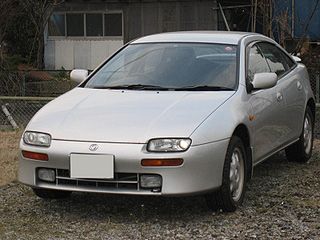 W
WThe Mazda Lantis is a series of two cars sold in Japan from 1993 to 1997. In the rest of the world it was also known as 323F, Astina, Allegro Hatchback or Artis Hatchback.
 W
WThe Mazda 737C is a prototype racing car that was built for Mazdaspeed for the 24 Hours of Le Mans under the Group C2 formula. It was the final evolution of the initial Mooncraft built design dating back to the 717C. It again used a 2-rotor 13B Wankel engine.
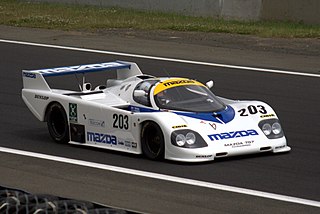 W
WThe Mazda 757 is a prototype racing car built by Mazdaspeed for the 24 Hours of Le Mans running under the IMSA-spec GTP class. It replaced the previous lineage of Group C2 class cars which ended with the 737C and was the first chassis built entirely by Mazdaspeed and designed by Nigel Stroud. The 747 designation was skipped to avoid confusion with the second generation Mazda RX-7, which was developed under the codename P747. The 757 used a new 3-rotor 13G Wankel engine.
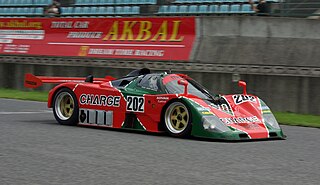 W
WThe Mazda 767/767B are prototype racing cars that were built by Mazdaspeed for the 24 Hours of Le Mans running under the IMSA-spec GTP class. The 767 replaced the 757 in 1988, upgrading to a newer and larger 4-rotor 13J Wankel engine which produced nearly 600 hp (450 kW).
 W
WThe Mazda 787 and its derivative 787B are Group C sports prototype racing cars that were developed by Japanese automobile manufacturer Mazda for use in the World Sportscar Championship, All Japan Sports Prototype Championship, and the 24 Hours of Le Mans from 1990 to 1991. Designed to combine a mixture of the Fédération Internationale du Sport Automobile (FISA) Group C regulations with the International Motor Sports Association (IMSA) GTP regulations, the 787s were the last Wankel rotary-powered racing cars to compete in the World and Japanese championships, using Mazda's R26B engine.
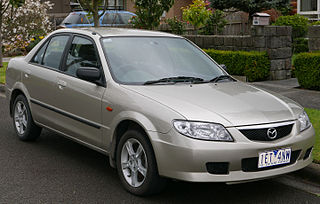 W
WThe Mazda Familia , also marketed prominently as the Mazda 323 and Mazda Protegé, is a small family car that was manufactured by Mazda between 1963 and 2003. The Familia line was replaced by the Mazda3/Axela for 2004.
 W
WThe Mazda RT24-P also known as the Mazda Road to 24 – Prototype is a Daytona Prototype International built to the 2017 IMSA DPi regulations. The car is designed and built by Mazda Motorsports, in collaboration with Multimatic Motorsports, and is based on the Riley-Multimatic Mk. 30 LMP2 chassis. This car is eligible for use in the Daytona Prototype International (DPi) class of the IMSA sanctioned WeatherTech Sportscar Championship. It made its racing debut at the 2017 Rolex 24 at Daytona, with SpeedSource Race Engineering, running under the Mazda Motorsports banner. There have been plans to open the car to customer sales, although none have come to fruition so far.
 W
WThe Mazda MXR-01 is a Group C sports prototype that was used by Mazda's factory team Mazdaspeed in the 1992 World Sportscar Championship season. It would be the final Mazda entry in sports car racing since the inception of its Le Mans project in 1983. It was based on the Jaguar XJR-14.
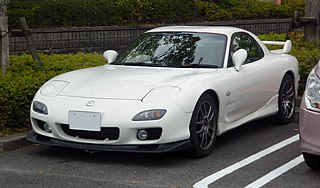 W
WThe Mazda RX-7 is a front/mid-engine, rear-wheel-drive, rotary engine-powered sports car that was manufactured and marketed by Mazda from 1978 to 2002 across three generations, all of which made use of a compact, lightweight Wankel rotary engine.
 W
WThe Mazda RX-792P is a sports prototype racing car built for the IMSA GT Championship's GTP category for Mazda. Its career was short lived, with only two cars running in 1992 before the project was abandoned.
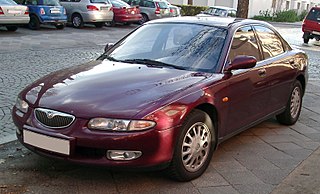 W
WThe Mazda Xedos 6 and Eunos 500 are compact executive cars that were produced between 1992 and 1999, with the Xedos 6 being sold in Europe by Mazda, and the Eunos 500 being sold in Japan and Australia by Eunos. The cars were not sold in North America, with the larger Xedos 9/Millenia model offered there instead. In total, 72,101 Xedos 6 and Eunos 500 automobiles were produced.